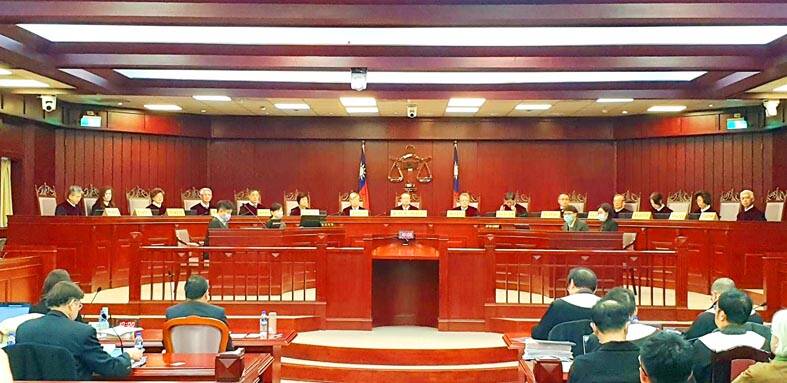The Constitutional Court yesterday ruled that slander as a punishable crime is constitutional, but its scope should be better defined.
The court heard 31 petitions for constitutional interpretation, including 20 filed by judges who said that slander was not clearly defined in practice and was not in line with the principle of unambiguous law.
Writer Chang Ta-chun (張大春) and media personality Neil Peng (馮光遠) also filed for a constitutional interpretation of slander after they were found guilty by local courts, saying that the rulings infringed on their right to free speech.

Photo: Yang Kuo-wen, Taipei Times
Chang was ordered to pay NT$3,000 for defaming the late pundit Liu Chun-yao (劉駿耀) in 2014 after calling him “shameful,” while Peng was ordered to pay NT$5,000 to former National Security Council secretary-general King Pu-tsung (金溥聰) in 2015.
Item 1, Article 309 of the Criminal Code states that a person who publicly insults another shall be sentenced to short-term imprisonment or a fine of not more than NT$9,0000. In practice, swear words and comments denigrating others as animals are common.
Meanwhile, Item 2, Article 309 states that a person who by violence commits an offense specified in the preceding paragraph shall be sentenced to imprisonment of not more than one year or a fine of not more than NT$15,000.
The Constitutional Court yesterday said that the law should not consider name-calling during arguments sufficient grounds to sustain defamation and that the environment, context, tone and reason for the argument should be taken into consideration.
The court said that whether one’s speech should be considered slander should be judged on how much it would affect the reputation of the person slandered, and whether said comments were conducive toward public affairs, literary matters or an expression of art, or positively contribute to academia or other professional domains, and whether, in isolated cases, one’s reputation should take precedence over one’s freedom of speech.
Only under such parameters would public slander not go against constitutionally guaranteed freedom of speech, it added.
Following the Constitutional Court’s interpretation yesterday, lawyers said that it would significantly change the landscape of the judiciary and greatly reduce the number of defamation lawsuits.
During a debate at the Constitutional Court last year, Ministry of Justice representative Kuo Yung-fa (郭永發) said that Article 309 of the Criminal Code was established to uphold people’s reputations, which is considered a basic right guaranteed by the Constitution.
Peng said that his comments, while poignant and acerbic, should be taken as political commentary, adding that Article 309 does not offer protection for commentary that could fit the criteria for slander.

AIR SUPPORT: The Ministry of National Defense thanked the US for the delivery, adding that it was an indicator of the White House’s commitment to the Taiwan Relations Act Deputy Minister of National Defense Po Horng-huei (柏鴻輝) and Representative to the US Alexander Yui on Friday attended a delivery ceremony for the first of Taiwan’s long-awaited 66 F-16C/D Block 70 jets at a Lockheed Martin Corp factory in Greenville, South Carolina. “We are so proud to be the global home of the F-16 and to support Taiwan’s air defense capabilities,” US Representative William Timmons wrote on X, alongside a photograph of Taiwanese and US officials at the event. The F-16C/D Block 70 jets Taiwan ordered have the same capabilities as aircraft that had been upgraded to F-16Vs. The batch of Lockheed Martin

GRIDLOCK: The National Fire Agency’s Special Search and Rescue team is on standby to travel to the countries to help out with the rescue effort A powerful earthquake rocked Myanmar and neighboring Thailand yesterday, killing at least three people in Bangkok and burying dozens when a high-rise building under construction collapsed. Footage shared on social media from Myanmar’s second-largest city showed widespread destruction, raising fears that many were trapped under the rubble or killed. The magnitude 7.7 earthquake, with an epicenter near Mandalay in Myanmar, struck at midday and was followed by a strong magnitude 6.4 aftershock. The extent of death, injury and destruction — especially in Myanmar, which is embroiled in a civil war and where information is tightly controlled at the best of times —

Taiwan was ranked the fourth-safest country in the world with a score of 82.9, trailing only Andorra, the United Arab Emirates and Qatar in Numbeo’s Safety Index by Country report. Taiwan’s score improved by 0.1 points compared with last year’s mid-year report, which had Taiwan fourth with a score of 82.8. However, both scores were lower than in last year’s first review, when Taiwan scored 83.3, and are a long way from when Taiwan was named the second-safest country in the world in 2021, scoring 84.8. Taiwan ranked higher than Singapore in ninth with a score of 77.4 and Japan in 10th with

SECURITY RISK: If there is a conflict between China and Taiwan, ‘there would likely be significant consequences to global economic and security interests,’ it said China remains the top military and cyber threat to the US and continues to make progress on capabilities to seize Taiwan, a report by US intelligence agencies said on Tuesday. The report provides an overview of the “collective insights” of top US intelligence agencies about the security threats to the US posed by foreign nations and criminal organizations. In its Annual Threat Assessment, the agencies divided threats facing the US into two broad categories, “nonstate transnational criminals and terrorists” and “major state actors,” with China, Russia, Iran and North Korea named. Of those countries, “China presents the most comprehensive and robust military threat